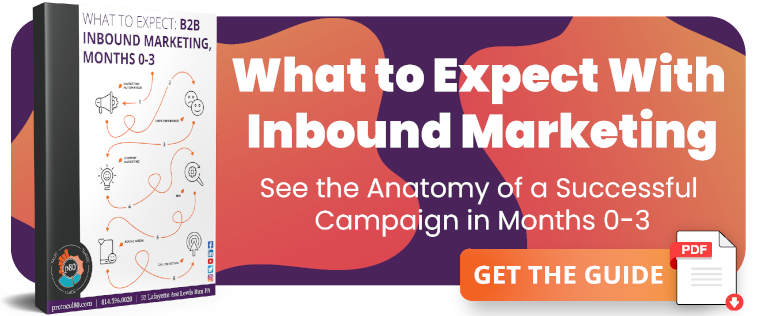Inbound Marketing Blog
for Manufacturers and Healthcare Companies
Content Marketing Services: What to Expect Realistically

As business owners, we make big decisions on a daily basis. Some are easy. Others, not so much.
One such decision here at protocol 80 was outsourcing our payroll processing and associated accounting to our accounting firm.
When we started adding to our team, I quickly recognized that I had a problem. I needed to make sure I was fulfilling my duties (at the time) in
- operations,
- business admin/finance,
- marketing,
- sales,
- HR/training,
- management, and
- janitorial
all while making sure my people got paid accurately and on time. I also needed to make sure Uncle Sam was taken care of on schedule.
I knew I had too many balls in the air, and was on the verge of letting some fall. The last thing any business owner wants is to screw up payments!
So, I did what anyone in my position would do. I hopped online and started researching payroll processing options. I researched whether the "cheaper" online processors really did the same quality of work as my local firm. I researched how my tax payment timelines might vary as my team grew. I read reviews. I compared guarantees. I looked into what other agencies do. I reviewed pricing.
After consuming all of that information, I was able to narrow my options to the software provider that we use for invoicing, and my local accounting firm. Ultimately, I decided to stick with my accountant.
The greatest thing about that decision? I was extremely confident in my choice because I researched the heck out of my options. As a marketing agency, I'm well aware this is all thanks to content marketing.
We Buy Differently Today
As my pursuit of a payroll processor shows, you and I are much more sophisticated buyers than we were 5+ years ago. We're more proactive in our research process, thanks to those smart devices on our desks and in our faces pockets.
(Also thanks to the abundance of content at our disposal.)
If you're engineering a new product and need to know what materials will work for the final design, you probably hop online and start researching, At that moment, your buying process has begun and you're engaging with CONTENT.
Content Marketing vs. Inbound Marketing
Before we get into expectations, let's define content vs. inbound marketing.
Think of inbound marketing as a full production line, and content marketing as the mechanisms that affect efficiency, quality, and cost of the final product (leads and sales). Inbound marketing isn't effective without an optimized content marketing strategy. Content marketing will struggle without the framework of inbound.
Here's the difference in context. Content marketing focuses on:
- Content creation
- Optimization
- Publication
- Distribution
- Curation
Inbound requires all of this, AND:
- Lead generation
- Lead nurturing
- Delighting customers
- SEO & PPC
- Email marketing
- Social media marketing
- Comprehensive analytics
- Conversion paths
- And more.
1. What do comprehensive content marketing services look like?
Strategy Development (Who, What, When...)
Any investment in marketing should be guided by a sound strategy. A content marketing strategy starts with defining who content is being created for. We're not talking about a target market. We're talking about buyer personas: a much deeper view into who your audience is, what they care about, what makes them tick.
Defining the 'who' is only one part. Your strategy also needs to define the 'why' on multiple levels:
- Why are we producing content in the first place (our goal(s))
- Why is our reader seeking out this content (their goal(s))
- Why should/would they care about our content
Your strategy will also identify 'how' you'll use content to achieve goals. This includes planning out the types of content, information, stories, themes, and formats (what) you'll be creating.
A content calendar is key to determining 'when' your content will be produced, and in what order. Will you be producing regular blog posts (say yes) and then launching a longer form eBook or webinar? Your strategy should lay this out explicitly.
Finally, your strategy should define 'where' your content will live and be promoted. Remember buyer personas? Where do they 'hang out' online? Your content needs to be there, where they're most likely to see it.
Related: A Content Marketing Strategy Needs Two Things
Content Production
With your content marketing strategy defined, your content marketing firm will get to work producing the content. They may start by evaluating and repurposing any content that you've already produced. Ultimately, they will be researching and writing your content in the form of:
- Blog posts
- Premium content offers (ebooks, white papers, checklists, etc...)
- Website copy
- Social media content
- Visual content (e.g., infographics)
- Emails
- Scripts
- Multimedia content
A content marketing firm will also update and maintain your content as needed.
Content Distribution
Great content is useless if no one sees it. That's where content distribution comes in. By understanding your audience, your content marketers know where to put your stuff so people see it.
This could be in social channels, search engines, other websites, or directly into their inbox.
2. What are realistic goals for a content marketing strategy?
Goals and revenue vary by company and industry. For instance, nonprofits may want donations and volunteers, educational institutions may want students or faculty, and B2B businesses may want more leads and clients.
Ultimately, your content marketing strategy should support your unique goals. Content aiming to recruit volunteers, employees, or students is going to be much different than content for sales-ready leads.
The bottom line here is: your content needs a clearly defined purpose. A lack of clear goals leads to wasted time and money. Speaking of money...

3. How much should I pay for content marketing services?
There are three different options to meet your content marketing needs.
Hire an in-house content marketing person (salary)
In-house means they have more control over and "access" to your marketing strategy, but it also comes with the usual employee investments, responsibilities, and paperwork.
An in-house marketer is not just a financial investment (salary + benefits). They'll also require time and energy to train, manage, and review performance. If you don't have content marketing expertise yourself, it may be hard to manage this in-house resource.
Writer "costs" vary depending on their experience level and your benefits package. You can easily spend anywhere from $20k-50k+, again, depending on their experience. A writer with niche experience for your industry will be more of an investment (but also produce a greater return) than a recent college graduate or journalist.
Another thing to consider is a writer does not equal a content marketer. Writing is a valuable skill, but effectively using writing to produce leads, sales, and ROI is a much different animal.
Outsource to a content marketing agency (retainer)
You can also partner with a content marketing agency to develop a strategy, produce content, and promote content. There are a few key benefits to partnering with a content marketing agency:
- You will benefit from a much higher level of expertise in content marketing (depending on the quality of the agency)
- You will have only minor management responsibilities for the partnership, mostly focused around progress and results
- You can easily cut ties if need be. Most agencies build an "out" into their contracts for both sides' benefit
Agencies that work on retainer will define expectations for the partnership. For example, you may need six blogs/month, one longer form premium content (ebook, video, etc...) every two months, and an email marketing campaign every month. The scope of creation and distribution affects your investment.
For content marketing ONLY (meaning, not full inbound marketing), you can look to invest $1,500-10,000+ per month. Costs depend on the size, location, & experience of the agency, and the size & needs of your business.
Hire a freelancer (cost per hour, word, or piece)
Last but not least, you can hire a freelance writer to produce content for you. In this instance, you are more responsible for strategy, direction, and editing. Most freelance writers will do some research for each piece, but aren't likely to come up with a comprehensive strategy.
Freelancers are often journalists or marketers who moonlight as content writers. If you're not the main priority, you'll probably see unpredictable and inconsistent production. Depending on your goals, this could be a huge problem, or no problem at all.
Freelancers tend to charge per hour, per word, or per piece. The cost for each ranges drastically, and also depends on experience/talent.
Finally, similar to in-house writers, freelancers may or may not have experience with effective content marketing.

4. How much do I need to budget for content marketing tools?
Assuming you already have a website with blogging capability, you may have all of the tools you need to get started with content marketing.
However, these tools are limited. Here are some other things to consider:
- HubSpot Marketing Platform
- The best all-inclusive, closed-loop reporting platform for inbound marketing AND content marketing
- Manage your blog, email, SEO, premium content, social media landing pages, CTAs, forms and analytics in one place
- Tracking & reporting is super simple
- $200-2,400/month
- (Full disclosure: we love HubSpot. We use it here at p80 for everything.)
- Google Analytics
- FREE for any website
- Learning curve to understand how to use effectively
- Vital if you don't use something like HubSpot for data analysis
- Tells you if your content marketing is achieving your goals
- MailChimp
- Free-~$200/month
- Enables email marketing and list management
- HootSuite
- Free-$50/month/user
- Publish to and monitor activity on your social networks
- Adobe Photoshop
- $10-80/month
- Edit and manipulate photos
There are a ton of other content marketing tools that you can look at. Depending on your interests and goals, you may pick up only one or two on this list. However, we love HubSpot as an all-in-one platform for serious marketers.
Results vs. Expectations
Let's bring all this together. What can you realistically expect from content marketing services?
- You can expect to generate more traffic to your online properties - owned, earned, or paid. This includes your blog, social pages, email newsletters, and sponsored ads.
- You can also expect higher quality traffic.
- If you are expecting a ton of new leads and sales opportunities to spontaneously enter your funnel, you have unrealistic expectations.
If you want to fill your funnel and see results quickly, you'll need a full inbound marketing strategy with a highly optimized content strategy built in. Inbound and content marketing can produce results on their own, but they truly shine when they work together.
Want to learn more about content marketing? Check out these similar articles:
Related: What Is Content?
Related: Why You Need High Quality Traffic
Related: Speed Blogging Tips
Our Blogs, Direct to Your Inbox!
How to Audit your Online Marketing
If you are executing digital marketing, congratulations! You are most likely already one step ahead of your competition, and making strides to meaningfully connect with prospects online. But, how do you know if you’re seeing continual success year over year, and improving your metrics?
Without the tools in place to analyze and benchmark your efforts, it is impossible to scale your online marketing and ensure continuous success.



